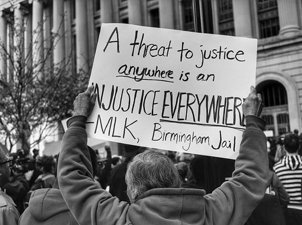
The First Step Act Doesn’t Go Far Enough
Joan Neal
May 25, 2018
The House just passed the First Step Act, a bill purporting to be a significant step forward in prison reform. Despite the claims of the bill’s supporters that it will make the prison system fairer and more effective, this bill will not alleviate the overcrowded, discriminatory nature of our federal prison system. In fact, while it contains some modest reforms such as prohibiting shackles on pregnant women during child birth; adding some educational, job training and personal development programs; and providing limited opportunities to earn ‘time credits’ toward early release, the bill fails to include provisions to overhaul and fundamentally transform the nation’s justice system. Research shows that we need both sentencing and prison reform to achieve meaningful change in our criminal justice system. The First Step Act, focusing only on the back end – more geared towards limiting prison time after someone is incarcerated — is inadequate to achieve that goal.
Backed by the White House (Jared Kushner and President Trump), the bill has the support of various individuals and factions of conservatives, including the Koch Brothers, Grover Norquist, Attorney General Jeff Sessions, most House Republicans (especially members of the House Freedom Caucus), Senate Majority Whip John Cornyn (R-Texas), who previously co-sponsored the bi-partisan Sentencing Reform and Corrections Act, and some moderate Democrats. Even with all of that support, the First Step Act fails to address some of the big problems in the current criminal justice system: racial disparities, chronic prison overcrowding, a focus on punishment rather than rehabilitation, and the exorbitant costs of incarceration, borne by the government, tax payers, prisoners and their families.
Moreover, some of its provisions could actually have the opposite effect of its intent by putting in place policies that are more discriminatory toward inmates of color and women. For instance, it calls for the development of a “risk assessment system,” to be implemented and overseen by the current Attorney General, who has a history of opposing sentencing reform, supporting punitive rather than rehabilitative policies and practices, and targeting immigrants and immigration related offenses. This bill may well do more harm than good.
Supporters of the bill argue that we must make a choice: either we pass prison reform or sentencing reform. There is no possibility to do both. It’s false to say there is only one choice. For several years, a comprehensive, bi-partisan bill – the Sentencing Reform and Corrections Act – has been gathering support in both houses. Clearly, passing comprehensive criminal justice reform is possible. We do not have to choose one or the other.
Meaningful criminal justice reform requires both front and back end changes. Congress should, therefore, abandon the First Step Act and take up the Sentencing Reform and Corrections Act instead.







